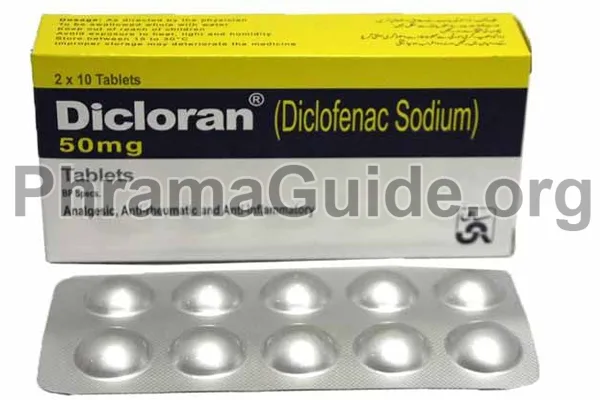Dicloran tablet is a non-steroidal anti-inflammatory drug used to treat pain, inflammation, and muscle stiffness. It is primarily used in mild-to-moderate pain and inflammation. Following are some common uses of Dicloran Tablet:
- Arthritis: Dicloran tablet is used to relieve pain associated with arthritis, such as osteoarthritis, rheumatoid arthritis, ankylosing spondylitis, gouty arthritis, and juvenile chronic arthritis.
- Inflammation Reduction: Dicloran tablet is used to reduce inflammation and swelling associated with various conditions, such as tendonitis and bursitis.
- Postoperative Pain: Dicloran tablets may be used to reduce pain and inflammation after surgery.
- Dental Pain: Dicloran tablets may be used to relieve dental pain, such as pain associated with tooth extraction or dental procedures.
- Dysmenorrhea: Dicloran tablets may be used to relieve pain associated with menstrual cramps.
- Acute Musculoskeletal Injuries: Dicloran tablets can be used for the short-term treatment of acute musculoskeletal injuries, such as sprains, strains, and sports injuries. It helps to reduce pain and inflammation, promoting faster recovery.
- Migraine and Headache: Dicloran tablet is effective in reducing the severity and duration of migraine headaches, as well as relieving associated symptoms such as nausea and vomiting. It may also used for treating tension headaches, which are characterized by a dull, aching pain in the head and neck.
Off-Label Uses of Dicloran Tablet
- Cancer Pain: Dicloran tablet has been used off-label for the management of cancer pain.
- Gout: Dicloran tablet has been used off-label for the treatment of acute gout attacks.
- Chronic Pain Conditions: Some healthcare professionals may use Dicloran off-label for chronic pain conditions that involve inflammation, such as fibromyalgia or chronic regional pain syndrome (CRPS).
- Sciatica: Dicloran tablet has been used off-label for the treatment of sciatica, a condition characterized by pain that radiates along the sciatic nerve.
- Chronic Back Pain: Dicloran tablet has been used off-label for the treatment of chronic back pain, which can be caused by a variety of underlying conditions.

What is Dicloran?
Dicloran is one of the leading brands of Diclofenac Sodium, manufactured and marketed by Sami Pharmaceuticals Pakistan.
Dicloran Alternatives : Other Similar Brands
The following are some alternative brands of Dicloran and their manufacturers.
- Voltral : Novartis, Pakistan.
- Phlogin : Brookes Pharmaceutical Laboratories (Pakistan) Ltd.
- Artifen : Abbott Laboratories (Pakistan) Ltd.
- Voren : Asian Continental (Pvt) Ltd, Pakistan.
- Dyclo : Indus Pharmaceuticals, Pakistan.
- Fastaid : Platinum Pharmaceuticals, Pakistan.
- Mobikare : Barrett Hodgson (Pvt) Ltd, Pakistan.
- Panslay : Getz Pharmaceuticals, Pakistan.
- Arnil : Brookes Pharmaceutical Laboratories (Pakistan) Ltd.
- Motaar : Standpharm Pakistan (Pvt) Ltd.
- Orthofenac : Bosch Pharmaceuticals, Pakistan.
- Magnofenac : AGP (Pvt) Ltd, Pakistan.
- Remethan : High-Q Pharmaceuticals, Pakistan.
Dicloran : Available Formulations and Strengths
Presently, Dicloran is available in Tablets, Injection and Gel Forms
Dicloran Tablet : 50mg Strength
Dicloran SR Tablet : 100mg strength
Dicloran Injection : 25mg/ml Strength
Dicloran Gel : 1.16%w/w.
Who Should Not Use Dicloran?
Although, Dicloran is an effective medication still it has some contraindications that should be considered prior to using the Dicloran tablet.
Dicloran should not use in:
Allergy or hypersensitivity: Dicloran is contraindicated in patients who have a history of allergic reactions to the medication or any other NSAIDs.
Asthma: Dicloran may worsen asthma symptoms in some individuals, and therefore it is contraindicated in patients with asthma.
Gastrointestinal bleeding and ulcers: Dicloran can increase the risk of gastrointestinal bleeding and ulcers, particularly in individuals who have a history of these conditions.
Renal impairment: Dicloran is contraindicated in patients with severe kidney disease, as it can cause further renal impairment.
Cardiac disease: Dicloran should be used with caution in patients with a history of heart disease, including congestive heart failure, heart attacks, and stroke.
Pregnancy and lactation: Dicloran should not be used during pregnancy or lactation unless recommended by a healthcare professional.
What is the Recommended Daily Dosage of Dicloran Tablet?
It’s also essential that patients understand the proper dosage of Dicloran in order to experience optimal benefits without risking adverse reactions.
The dose for adults is 50mg (1 tablet of Dicloran) twice daily but can range from 25-100mg depending on age, weight, and severity of symptoms being treated. Patients should never exceed 200mg (4 tablets of Dicloran) per day unless approved by their physician.
How Dicloran Works?
Dicloran is primarily through its inhibition of cyclooxygenase (COX) enzymes. COX enzymes are responsible for the conversion of arachidonic acid into prostaglandins which mediate inflammatory processes such as swelling and pain.

Leave A Comment